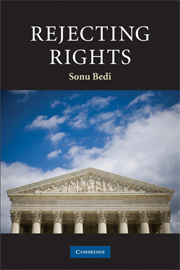Book contents
- Frontmatter
- Contents
- Acknowledgements
- Table of cases
- Introduction
- Part I Rights
- Part II Justification in theory
- Part III Justification in practice
- 6 Rejecting the constitutional rights to property and religion
- 7 Rejecting the constitutional right to privacy
- 8 Equal protection and judicial review
- Conclusion
- Bibliography
- Index
Conclusion
Published online by Cambridge University Press: 01 July 2009
- Frontmatter
- Contents
- Acknowledgements
- Table of cases
- Introduction
- Part I Rights
- Part II Justification in theory
- Part III Justification in practice
- 6 Rejecting the constitutional rights to property and religion
- 7 Rejecting the constitutional right to privacy
- 8 Equal protection and judicial review
- Conclusion
- Bibliography
- Index
Summary
Occam's razor contends that all other things being equal the simplest theory is the correct one. All along my goal was to propose a sounder account of limited government, an account that better balances and realizes the values of liberty and democracy. Constraining the rationale on which the polity may act frees us from the problematic baggage of rights, channeling democratic debate in a more fruitful direction. In making this turn to legislative rationale or purpose convincing, I have proposed a concrete, and hopefully persuasive, theory of Justification, one that even resonates with American constitutional law. My primary aim was to convince you that we should re-conceptualize limited government by looking to the democratic polity's reason for acting. Reasons not rights ought to do the normative work.
The lack of robust democratic debate is not the problem with contemporary politics. Rather, contemporary politics seems beset by the problem of unnecessary, often fruitless debate on some matters and not enough on others. While the debate over same-sex marriage is so heated and the abortion controversy so exasperating, their Social Security or welfare counterpart is not. My theory of Justification stands as a corrective. If the polity may only seek to minimize demonstrable, non-consensual harm, there is no good reason to prohibit same-sex marriage just as there's no good reason to regulate the sexual activity of redheads or blonds. On the other hand, reasonable people can and should disagree over what welfare policy (if any) best minimizes harm.
- Type
- Chapter
- Information
- Rejecting Rights , pp. 189 - 190Publisher: Cambridge University PressPrint publication year: 2009



